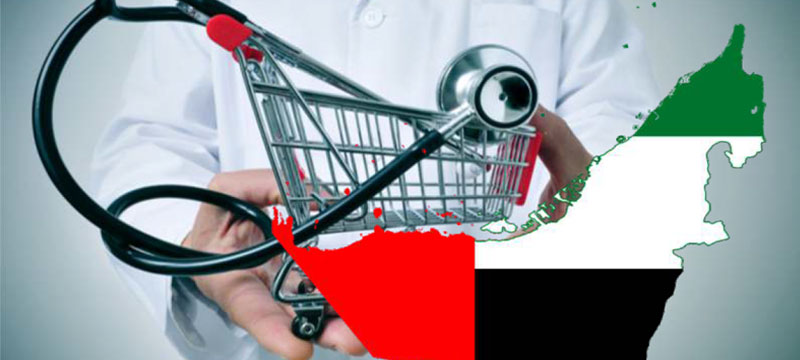TNational Agenda and the UAE Vision 2021, all public and private hospitals in the UAE are to
obtain accreditation by fulfilling all national and international standards, ensuring good quality services
and an adequate number of medical personnel. The move is in keeping with the directives of Vice
President, Prime Minister and Ruler of Dubai, His Highness Sheikh Mohammed bin Rashid Al Maktoum.
The UAE has declared its National Agenda indicators and set up executive teams to implement them.
The National Agenda aims to promote preventive measures, reduce instances of chronic diseases such as
diabetes, cardiac diseases and cancer, cut down smoking and obesity in children, and work towards
increasing longevity. It is aimed at putting the UAE in the list of the world’s best countries in terms of the quality of
healthcare.
QUALITY OF HEALTHCARE INDICATOR
The year 2016 saw the UAE attain 28th position in the quality of healthcare indicator, up from 34th in 2015.The Legatum Institute for Prosperity, which issues this indicator, covers 149 countries and measures the quality of healthcare services on three counts: fundamental healthcare, infrastructure and preventive healthcare,
and the level of satisfaction with mental and physical healthcare services.
Results showed that most of the residents answered “no” when asked if they suffer from health problems that
prevent them from doing their work. The response took the UAE to the top position internationally in this subindicator.
In case of another sub-indicator about the level of satisfaction about healthcare services, the UAE
emerged in 9th position internationally, thus joining the top ten countries in the world whose people expressed
satisfaction about the healthcare services. The results reflected that UAE society enjoys good mental and
physical health.
The number of accredited health facilities in the UAE rose from 46.8 percent in 2014 to 55 percent in 2015.
Accreditation is a UAE indicator to measure the level of compliance of public and private hospitals with national and international standards.
The International Diabetes Federation, IDF, put the number of diabetic patients in the UAE in 2015 at 19.3
percent of the population, making it the best state in the GCC after Oman, which accounted for 14.8 percent of its
population who suffered from this condition.The National Agenda is keen to bring down the instance of
diabetes by promoting a healthy lifestyle, encouraging healthy eating habits, and encouraging sports.
The expected average healthy age indicator, which measures the average number of years for which an
individual lives a healthy life, is issued by the World Health Organisation as part of its compilation of world
health statistics covering 194 countries.
NEARING SELF-SUFFICIENCY IN GENERIC DRUG PRODUCTION
Furthermore, the UAE is close to being self-sufficient in producing generic drugs as 16 pharmaceutical facilities
are manufacturing up to 1,000 such drugs. The country is also planning to increase the number of facilities to 30 by
2020, according to a senior official from the Ministry of Health and Prevention.
The UAE is close to being self-sufficient in producing generic drugs as 16 pharmaceutical facilities are manufacturing up to 1,000 such drugs. The country is also planning to increase the number of facilities to 30 by 2020.
This is another indication of the strong growth of the pharmaceutical industry and the efforts being exerted to
improve the UAE’s global competitiveness, said Dr Ameen Hussain Al Amiri, the Ministry’s Assistant
Under-Secretary for Public Health and Licensing, while speaking at a workshop on the pharmaceutical industry,
organized by the Ministry.
“The global biopharmaceutical market is huge as manufacturers are planning to produce biopharmaceuticals
– biologic medications or biologics – using living organisms and DNA. Producing biologics is more
expensive and more effective than generic drugs;
As the population increases and healthcare demands burgeon, government strategies such as
Emirates Vision 2021 are committed to continuing improvements in healthcare services throughout the emirates. Reducing the need for Emiratis to travel abroad for specialized treatment is a key driver in this area.
however, biologics will remain less expensive,” added Al Ameri, who is also Vice Chairman of the Ministry’s Drug
Pricing and Registration Higher Committee. A biopharmaceutical is any pharmaceutical drug product manufactured in, extracted from or semisynthesised from biological sources. Different from totally synthesised pharmaceuticals, these include vaccines, blood, blood components, allergenics, somatic cells, gene therapies, tissues, recombinant therapeutic protein and living cells used in cell therapy.
SOPHISTICATED INFRASTRUCTURE
The UAE has a highly developed health service, including a sophisticated physical infrastructure of wellequipped
hospitals, specialised clinics and primary care centres. Health care in the UAE is provided in over 70
public and private hospitals. In addition, over 150 healthcare centres and clinics focus on primary care.
This health infrastructure stands in stark contrast to the 7 hospitals and 12 health centres that were in place
when the UAE Federation was established in 1971. The UAE Ministry of Health oversees implementation of
government policy in relation to the provision of comprehensive health care for all UAE citizens and
residents. UAE nationals are covered by free health insurance schemes and sponsors are required to provide
health insurance for all employees and their dependants. Health Authority – Abu Dhabi (HAAD) introduced
mandatory health care for all workers in 2006. By 2013, the Abu Dhabi health insurance system covered 2.73
million people. Dubai Health Authority (DHA) has also implemented insurance schemes for nationals and residents.
As the population increases and healthcare demands burgeon, government strategies such as Emirates Vision
2021 are committed to continuing improvements in healthcare services throughout the emirates. Reducing
the need for Emiratis to travel abroad for specialized treatment is a key driver in this area. The 364-bed Cleveland Clinic Abu Dhabi (CCAD) opened in mid-2015. This is part of a growing network of medical facilities operated by Abu Dhabi investment company Mubadala. Eighty per cent of doctors at CCAD come from institutions in the United States and one-third of these have medical experience at the Cleveland Clinic in Ohio. Cleveland Clinic personnel have a long-standing presence in the region through management of Sheikh Khalifa Medical City. Services at the new facility have been tailored under the mandate of HAAD to complement the range of healthcare services that are
already being offered in the emirate. The new Paediatrics Clinic at Tawam Hospital, which is operated in affiliation with Johns Hopkins Medicine and Abu Dhabi Health Services Company (SEHA), is also designed to fill gaps dentified in HAAD Gap Analysis reports. In certain situations healthcare can be delivered remotely using sophisticated telemedicine facilities such as Telemed, which is available at Abu Dhabi Telemedicine Centre, a joint venture between Mubadala Development Company and Switzerland’s leading telemedicine provider, Medgate AG.
Abu Dhabi’s CCAD, Sheikh Khalifa City Hospital, Mafraq and Tawam Hospitals join the many hospitals throughout Dubai and the other emirates in providing UAE residents and nationals with a high stand of medical care. Dubai Healthcare City, which has recently announced its second phase, is instrumental in this process. As well as minimising the necessity to send patients abroad, medical tourists are also encouraged to come to the country to avail of these new facilities. The medical tourism sector is projected to grow by about 15 per cent annually.
DHA’S MASTER PLAN
The Dubai Health Authority (DHA) master plan 2013–2025 includes a Dh3 billion revamp of Rashid Hospital, which incorporates a new Trauma Care Centre, and the 200-bed Al Jalila Children’s Speciality Hospital. The plan also includes establishing 40 new primary healthcare centres and three new hospitals, as well as three new medical colleges and five nursing schools over the coming ten years. These three new colleges are in addition to the University of Sheikh Mohammed bin Rashid for Medicine and Health Sciences. A strategy has also been developed to make the nursing profession more attractive, especially to Emiratis. Currently, pre- and post-natal care in the UAE is on a par with the world’s most developed countries. Maternal mortality rates in 2008 were 10 per 100,000 and 99 per cent of births are attended by skilled health personnel.The infant mortality rate in 2012 was 7 per 1,000 live
births and the mortality rate for under-fives was 8 per 1,000 live births.
Available figures on immunisation ratios for all vaccines show that they are administered uniformly to over 90 per
cent of newborns. Most infectious diseases like malaria, measles and poliomyelitis that were once prevalent in
the UAE have been eradicated. New vaccination campaigns are taking place to protect against chicken pox, pertusis and the rotavirus











